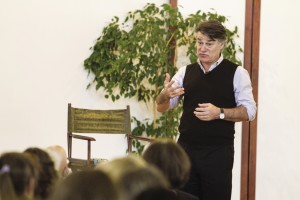David Whyte, an internationally recognized poet, author and expert in organizational development, came to campus in late February for an event highlighting the 20th anniversary year of the master’s in counseling program – the first EMU program outside of Eastern Mennonite Seminary to produce graduates at the master’s degree level.
Whyte’s day-long workshop was attended by EMU faculty, students and counseling graduates, along with some participants who traveled from elsewhere in the mid-Atlantic region. In the evening in Lehman Auditorium, Whyte interspersed reflective remarks with poetry, holding hundreds rapt as he explored “the foundation of conversational leadership.”
Whyte showed his audience how – to borrow words from one of his published writings – “a good poem looks life straight in the face, unflinching, sincere, equal to revelation through loss or gain. … At the center of our lives, in the midst of the busyness and the forgetting, is a story that makes sense when everything extraneous has been taken away.”

For leaders in business, education, the social services and other fields, Whyte offered this thought: “Following a vocation or an art form through decades of practice and understanding will break the idealistic heart that began the journey and replace it, if we sidestep the temptations of bitterness and self-pity, with something more malleable, compassionate and generous than the metaphysical organ with which we began the journey.”
Long-time counseling professor David Glanzer ’71 said, “I have heard David Whyte several times at national conferences before audiences of several thousand. He speaks about the human condition in new ways and with great insight.” Glanzer described the EMU seminar as “an exciting opportunity for personal reflection and professional growth” in an intimate setting.
Since 1995 when the inaugural cohort of 10 future counselors and therapists completed their rigorous two years of professional studies, a total of 227 graduates have earned masters degrees at EMU. Only 62 of that number were EMU undergraduate students. The vast majority were attracted by the program’s reputation for nationally accredited excellence and by its creative community, aiming to train the whole person (mind, body and spirit) for the challenging work of counseling.
“Being part of a small Christian university is actually a strength of our program,” said Glanzer, who was a founding faculty member of the program. “The sense of community, the shared values of service, and the interdisciplinary opportunities to collaborate with EMU’s other graduate programs, all help to create our program’s distinctive flavor.”
Family Life Resource Center
As divorce and separation gained greater acceptance within the Mennonite church in the 1980s, congregations in the area struggled to deal with the toll these exacted on families. In response, the Virginia Mennonite Conference formed a committee to look at ways the church could better support its members who were affected by dissolving marriages.
The result: the opening, in 1987, of the Family Life Resource Center (FLRC). Among its first counselors were Jim Glanzer ’75 and Harvey Yoder ’64, both of whom remain at FLRC today. Other alumni now on staff include director Andrea Bieber ’98, MA ’00 (counseling), Mark Sensabaugh ’81, and Dana Blauch, MA ’12 (counseling).
Over the past 25 years, FLRC has grown into a full-fledged mental health counseling center that has branched out from its original focus on supporting families to offer services ranging from substance abuse counseling to court-ordered parenting classes.
FLRC has been open to the general public since the beginning. Now, Yoder estimates, just 10% of its clients belong to churches in the Virginia Mennonite Conference. The center still maintains its overt Christian identity, although it doesn’t approach its work with individual clients from any one specific set of denominational beliefs.
For more than a decade and a half, FLRC contracted with EMU to provide on-campus counseling services to students, faculty and staff – EMU now offers in-house counseling – but FLRC continues to have a relationship with EMU by hosting interns and residents from the graduate counseling program.
— Andrew Jenner ’04